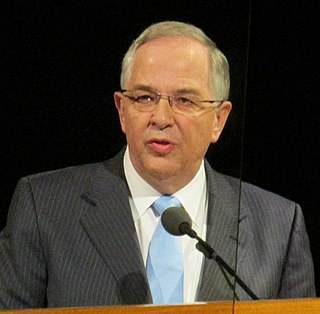A Quote by Timothy Keller
Christ literally walked in our shoes and entered into our affliction. Those who will not help others until they are destitute reveal that Christ's love has not yet turned them into the sympathetic persons the gospel should make them.
Related Quotes
Let us meditate until we perceive the Infinite Christ reigning in our own hearts. Let us learn to love those who love us not; and to forgive those who do ill against us. Let us break all our mental boundaries of color, creed, and nationality, and receive all - even our inanimate and animal brothers - in the endless, all embracing arms of our Christ Consciousness. This will be a true and fitting celebration of the coming of Jesus Christ to this earth.
The love shown in Christ by our God to mankind should constrain all of us who are followers and disciples of Christ to do all in our power to see to it that the Message of Salvation is carried to those of our fellows for whom Christ Our Saviour was sacrificed but who have not had the benefit of hearing the good news.
The proverb has it that Hunger is the best cook. The Law makes afflicted consciences hungry for Christ. Christ tastes good to them. Hungry hearts appreciate Christ. Thirsty souls are what Christ wants. He invites them: Come unto me, all ye that labour and are heavy laden, and I will give you rest. Christ's benefits are so precious that He will dispense them only to those who need them and really desire them.
Because we love the Lord, we should be spiritually sensitive to moments when the powerful and important truths of the gospel can be shared with others. Perhaps more importantly, however, we should seek at all times to purify ourselves and to lead such worthy lives that the Light of Christ emanates from us in all that we say and do. Our day-to-day lives should stand as immutable witness of our faith in Christ.
It's so easy in life for us to receive blessings, many of them almost uncounted, and have things happen in our lives that can help change our lives, improve our lives, and bring the Spirit into our lives. But we sometimes take them for granted. How grateful we should be for the blessings that the gospel of Jesus Christ brings into our hearts and souls. I would remind all of you that if we're ever going to show gratitude properly to our Heavenly Father, we should do it with all of our heart, might, mind, and strength-because it was He who gave us life and breath
Holy Week challenges us to step outside ourselves so as to attend to the needs of others: those who long for a sympathetic ear, those in need of comfort or help. We should not simply remain in our own secure world, that of the ninety-nine sheep who never strayed from the fold, but we should go out, with Christ, in search of the one lost sheep, however far it may have wandered.
Christ had no interest in gathering vast crowds of professed adherents who would melt away as soon as they found out what following Him actually demanded of them. In our own presentation of Christ's gospel, therefore, we need to lay a similar stress on the cost of following Christ and make sinners face it soberly before we urge them to respond to the message of free forgiveness. In common honesty, we must not conceal the fact that free forgiveness in one sense will cost everything.
No wonder if such persons look upon imputed righteousness as the shadow of a dream, who esteem those things which evidence its necessity to be but fond imaginations. And small hope is there to bring such men to value the righteousness of Christ, as imputed to them, who are so unacquainted with their own unrighteousness inherent in them. Until men know themselves better, they will care very little to know Christ at all.
It's fine to deal with people's doubts and explain why they have good reasons to believe in Christ. But until we tell them the good news of Jesus Christ, we haven't done our job. They need a saviour that God has provided them in Christ. Once they know that, we can do as much apologetics as we need to.
We are not preaching the Gospel of a dead Christ, but of a living Christ who sits exalted at the Father's right hand, and is living to save all who put their trust in Him. That is why those of us who really know the Gospel never have any crucifixes around our churches or in our homes. The crucifix represents a dead Christ hanging languid on a cross of shame. But we are not pointing men to a dead Christ; we are preaching a living Christ. He lives exalted at God's right hand, and He "saves to the uttermost all who come to God by Him."
And of what should we be afraid? Our captain on this battlefield is Christ Jesus. We have discovered what we have to do. Christ has bound our enemies for us and weakened them that they cannot overcome us unless we so choose to let them. So we must fight courageously and mark ourselves with the sign of the most Holy Cross.
I witness that Jesus Christ is the Savior of the world. He suffered and died for our sins and rose the third day. He is resurrected. In a future day, every knee will bow and every tongue confess that He is the Christ. On that day, our concern will not be, 'Do others consider me Christian?' At that time, our eyes will be fixed on Him, and our souls will be riveted on the question, 'What thinks Christ of me?'



































